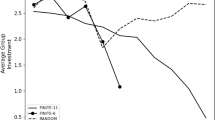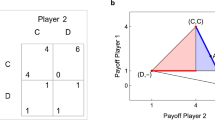Abstract
In sequential social dilemmas with stranger matching, initiating cooperation is inherently risky for the first mover. The disclosure of the second mover’s past actions may be necessary to instigate cooperation. We experimentally compare the effect of mandatory and voluntary disclosure with non-disclosure in a sequential prisoner’s dilemma situation. Our results confirm the positive effects of disclosure on cooperation. We also find that voluntary disclosure is as effective as mandatory disclosure, which runs counter to the results of existing literature on this topic. With voluntary disclosure, second movers who have a good track record chose to disclose, suggesting that they anticipate non-disclosure would signal non-cooperativeness. First movers interpret non-disclosure correctly as a signal of non-cooperativeness. Therefore, they cooperate less than half as often when the second mover decides not to disclose.
Similar content being viewed by others
References
Acquisti, A., Taylor, C., Wagman, L.: The economics of privacy. J. Econ. Lit. 54(2), 442–92 (2016)
Arechar, A.A., Gächter, S., Molleman, L.: Conducting interactive experiments online. Exp. Econ. 21, 99–131 (2018)
Benndorf, V., Kübler, D., Normann, H.-T.: Privacy concerns, voluntary disclosure of information, and unraveling: an experiment. Eur. Econ. Rev. 75, 43–59 (2015)
Benndorf, V., Normann, H.-T.: The willingness to sell personal data. Scand. J. Econ. 120(4), 1260–1278 (2018)
Bertomeu, J., Cianciaruso, D.: Verifiable disclosure. Econ. Theory 65(4), 1011–1044 (2018)
Bohnet, I., Huck, S.: Repetition and reputation: implications for trust and trustworthiness when institutions change. Am. Econ. Rev. 94(2), 362–366 (2004)
Bolton, G.E., Katok, E., Ockenfels, A.: How effective are electronic reputation mechanisms? An experimental investigation. Manag. Sci. 50(11), 1587–1602 (2004)
Brandts, J., Charness, G.: Hot vs. cold: sequential responses and preference stability in experimental games. Exp. Econ. 2(3), 227–238 (2000)
Brandts, J., Charness, G.: The strategy versus the direct-response method: a first survey of experimental comparisons. Exp. Econ. 14(3), 375–398 (2011)
Brown, A.L., Camerer, C.F., Lovallo, D.: To review or not to review? Limited strategic thinking at the movie box office. Am. Econ. J. Microecon. 4(2), 1–26 (2012)
Bénabou, R., Tirole, J.: Incentives and prosocial behavior. Am. Econ. Rev. 96(5), 1652–1678 (2006)
Camera, G., Casari, M.: Cooperation among strangers under the shadow of the future. Am. Econ. Rev. 99(3), 979–1005 (2009)
Cameron, A.C., Trivedi, P.K., et al.: Microeconometrics using stata, vol. 2. Stata Press, College Station (2010)
Casari, M., Cason, T.N.: The strategy method lowers measured trustworthy behavior. Econ. Lett. 103(3), 157–159 (2009)
Charness, G., Du, N., Yang, C.-L.: Trust and trustworthiness reputations in an investment game. Games Econ. Behav. 72(2), 361–375 (2011)
Clark, K., Sefton, M.: The sequential prisoner’s dilemma: evidence on reciprocation. Econ. J. 111(468), 51–68 (2001)
Cox, C.A., Jones, M.T., Pflum, K.E., Healy, P.J.: Revealed reputations in the finitely repeated prisoners’ dilemma. Econ. Theory 58(3), 441–484 (2015)
Dranove, D., Jin, G.Z.: Quality disclosure and certification: theory and practice. J. Econ. Lit. 48(4), 935–63 (2010)
Duffy, J., Ochs, J.: Cooperative behavior and the frequency of social interaction. Games Econ. Behav. 66(2), 785–812 (2009)
Duffy, J., Xie, H., Lee, Y.-J.: Social norms, information, and trust among strangers: theory and evidence. Econ. Theory 52(2), 669–708 (2013)
Engelmann, D., Strobel, M.: Inequality aversion, efficiency, and maximin preferences in simple distribution experiments. Am. Econ. Rev. 94(4), 857–869 (2004)
Feess, E., Kerzenmacher, F.: Sorting of trustees: the good and the bad stay in the game. Econ. Theory (2023). https://doi.org/10.1007/s00199-023-01491-3
Gächter, S., Renner, E.: The effects of (incentivized) belief elicitation in public goods experiments. Exp. Econ. 13, 364–377 (2010)
Gaechter, S., Lee, K., Sefton, M., et al.: The variability of conditional cooperation in sequential prisoner’s dilemmas. Technical Report (2022)
Ghidoni, R., Cleave, B.L., Suetens, S.: Perfect and imperfect strangers in social dilemmas. Eur. Econ. Rev. 116, 148–159 (2019)
Ghidoni, R., Suetens, S.: The effect of sequentiality on cooperation in repeated games. Am Econ J Microecon 14, 58 (2022)
Giamattei, M., Yahosseini, K.S., Gächter, S., Molleman, L.: Lioness lab: a free web-based platform for conducting interactive experiments online. J Econ Sci Assoc 6, 95–111 (2020)
Hagenbach, J., Saucet, C.: Motivated Skepticism. Working Paper (2022)
Harrs, S., Rockenbach, B., Wenner, L.M.: Revealing good deeds: disclosure of social responsibility in competitive markets. Exp. Econ. 25, 1–25 (2022)
Jin, G.Z., Luca, M., Martin, D.: Is no news (perceived as) bad news? An experimental investigation of information disclosure. Am. Econ. J. Microecon. 13(2), 141–73 (2021)
Jin, G.Z., Luca, M., Martin, D.: Complex disclosure. Manag. Sci. 68(5), 3236–3261 (2022)
Kamei, K.: Endogenous reputation formation under the shadow of the future. J. Econ. Behav. Organ. 142, 189–204 (2017)
Kamei, K.: Voluntary disclosure of information and cooperation in simultaneous-move economic interactions. J. Econ. Behav. Organ. 171, 234–246 (2020)
Kamei, K., Putterman, L.: Play it again: partner choice, reputation building and learning from finitely repeated dilemma games. Econ. J. 127(602), 1069–1095 (2016)
Keser, C.: Experimental games for the design of reputation management systems. IBM Syst. J 42(3), 498–506 (2003)
Mengel, F.: Risk and temptation: a meta-study on prisoner’s dilemma games. Econ. J. 128(616), 3182–3209 (2017)
Miettinen, T., Kosfeld, M., Fehr, E., Weibull, J.: Revealed preferences in a sequential prisoners’ dilemma: a horse-race between six utility functions. J. Econ. Behav. Organ. 173, 1–25 (2020)
Milgrom, P.R.: Good news and bad news: representation theorems and applications. Bell J. Econ. 12, 380–391 (1981)
Montero, M., Sheth, J.D.: Naivety about hidden information: an experimental investigation. J. Econ. Behav. Organ. 192, 92–116 (2021)
Penczynski, S., Koch, C., Zhang S.: Disclosure of verifiable information under competition: an experimental study. Available at SSRN 4130449 (2022)
Schudy, S., Utikal, V.: ‘You must not know about me’-on the willingness to share personal data. J. Econ. Behav. Organ. 141, 1–13 (2017)
Sheth, J.D.: Disclosure of information under competition: an experimental study. Games Econ. Behav. 129, 158–180 (2021)
Tversky, A., Kahneman, D.: Advances in prospect theory: Cumulative representation of uncertainty. J. Risk Uncertain. 5(4), 297–323 (1992)
Varian, H.R.: Economic Aspects of Personal Privacy, pp. 101–109. Springer, Boston (2009)
Author information
Authors and Affiliations
Corresponding author
Additional information
Publisher's Note
Springer Nature remains neutral with regard to jurisdictional claims in published maps and institutional affiliations.
We thank Elias Fernandez and Antoine Deplancke for helping with the experiment in Brussels and Lille. This project received financial support from Fonds de la Recherche Scientifique (FNRS, PDR T014318F). The data used in this manuscript can be found at https://doi.org/10.5281/zenodo.10691582.
Rights and permissions
Springer Nature or its licensor (e.g. a society or other partner) holds exclusive rights to this article under a publishing agreement with the author(s) or other rightsholder(s); author self-archiving of the accepted manuscript version of this article is solely governed by the terms of such publishing agreement and applicable law.
About this article
Cite this article
Kirchsteiger, G., Lenaerts, T. & Suchon, R. Voluntary versus mandatory information disclosure in the sequential prisoner’s dilemma. Econ Theory (2024). https://doi.org/10.1007/s00199-024-01563-y
Received:
Accepted:
Published:
DOI: https://doi.org/10.1007/s00199-024-01563-y




